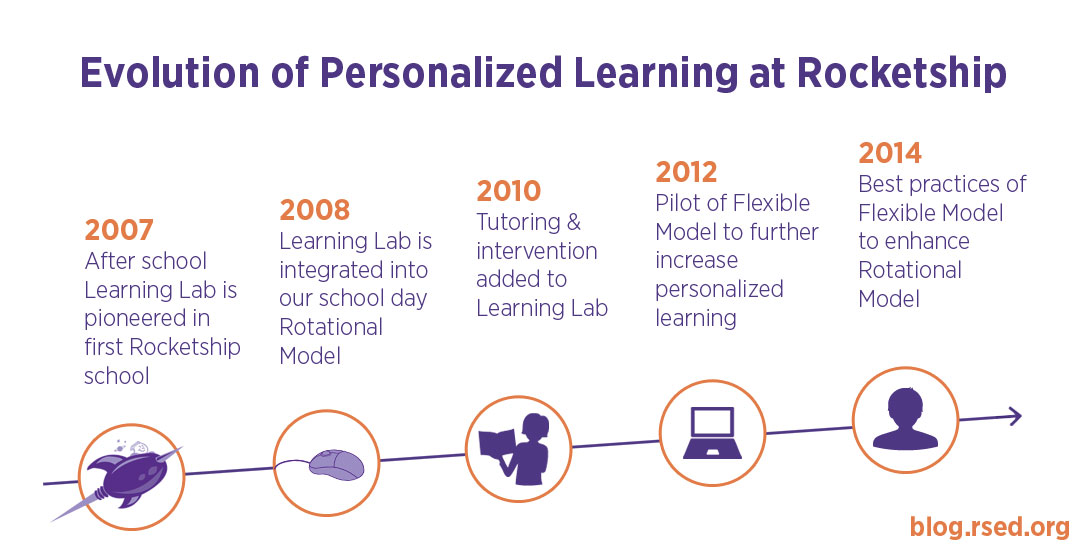
Personalized Learning: What’s Next
by Preston Smith, Co-Founder and CEO, Rocketship Public Schools
Yet, in rethinking elementary school from the ground up, we will never be satisfied. In our work to transform the lives of students and eliminate the achievement gap, we know that we must constantly be reflecting on ourselves, our work, and our pedagogical approach. We need to make decisions that are grounded in data with the best interest of our students and communities in mind. At the same time we must continuously ask ourselves if our schools are optimizing every moment of every day for each one of our incredible Rocketeers. Are we truly personalizing education?
As Steve Jobs said, “Innovation distinguishes between a leader and a follower.”
Over the last two years, the Rocketship team has engaged deeply in further innovating on our instructional model. We wanted to push the limits, to see if we could realize even greater results and opportunities for our Rocketeers, to put technology, tutoring, and blended learning in direct control of our amazing teachers, and help our older Rocketeers become even more successful as independent learners. To do so, we pursued what we called a ‘flexible model,’ which we implemented in an open space classroom.
Responsible Reflection
Across the aisle from innovation sits responsibility— as we innovate, we must regularly assess the results, look at the data, listen to feedback from our students, families, and staff, and measure progress to ensure that we are moving forward responsibly. Every decision should be informed by data and feedback as we improve our schools for our Rocketeers and their families.
In reflecting on our progress with the flexible model, we poured over the data, engaged our teachers, and surveyed students and families. We made several discoveries:
- Over the course of the past two years, the results of the pilots were mixed. In some flexible classrooms, students outperformed the current rotational model and in others, students performed below the average.
- Staff appreciated the opportunities for collaboration and integration of technology in the flexible model, and saw benefits from students building skills in self-direction.
- Our rockstar teachers said that a significant effort was required to implement the flexible model—effort that was not necessarily commensurate with results.
What’s Next
With continuous innovation comes frequent adjustments— to ensure we’re always moving towards a world where every student thrives. We believe the large investment required to optimize the flexible model in this space will yield the greatest benefits by applying the lessons we’ve learned around personalization to enhance the rotational model. Based on best practices from our flexible model, our teachers can further optimize groupings and time, better integrate online programs, and push quality instruction even further in our rotational model.
Over the coming months we will be digging in with our team of educators to flesh out exactly what this means in classrooms next year, including getting teachers the training and support they need to integrate this evolution in a way that works. The details will address our pursuit of truly personalized instruction through two key imperatives:
- Meeting each student’s personal learning needs through flexible use of teacher and tutor time; and
- Supporting student mastery of core skills, including technology literacy.
Innovation can be a messy process, but we are committed to demonstrating what public education can be for all students. We will continue to rethink elementary school from the ground up, and that means making adjustments along the way.
I’m proud that Rocketship has been a leader in the movement to ensure every kid has access to an excellent school. Our organization was founded on the principle that continuous innovation and improvement is the only way to make a difference for ALL children. Our entire team approaches our work by asking, “How can we make this even better?”
So, just like that first hot and muggy day at Rocketship, when we struggled through figuring out how to make the rotational model work, we will continue to innovate. We will push towards even greater schools for our Rocketeers and families. We will fearlessly approach rethinking elementary school so that we can truly personalize learning for each of our Rocketeers.
It’s the only way to realize quality and maximize our impact for all of our incredible kids and families…and that’s what each one of our Rocketeers and families deserve.
—
Follow Preston on Twitter: @prestondsmith
Published on March 18, 2014
Read more stories about: Most Popular Stories, Personalized Learning.



